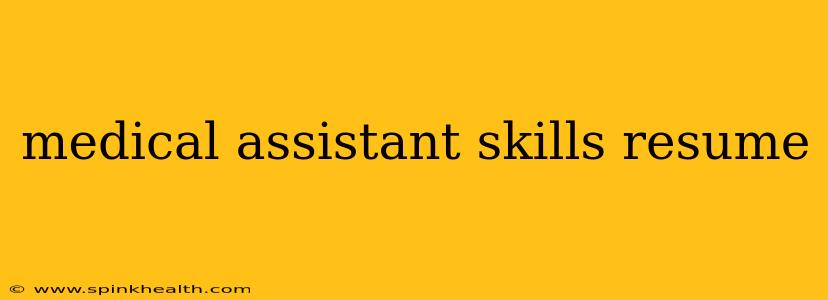Crafting the Perfect Medical Assistant Resume: A Skill-Based Story
Landing that dream medical assistant job isn't just about listing tasks; it's about showcasing your skills in a way that resonates with hiring managers. Think of your resume as a compelling narrative, highlighting your abilities and experience to paint a picture of a dedicated and capable professional. This isn't just a list of what you did; it's a demonstration of what you can do.
This guide will walk you through crafting a resume that grabs attention and lands you interviews. We'll focus on highlighting your skills, using keywords effectively, and structuring your resume for maximum impact.
1. Highlighting Your Core Medical Assistant Skills:
This is where your story begins. Don't just list "vital signs" or "phlebotomy." Instead, quantify your accomplishments. Imagine a recruiter reading your resume – what would make them stop and say, "Wow, this person is impressive"?
Examples:
-
Instead of: "Took vital signs."
-
Write: "Accurately recorded vital signs for an average of 25 patients daily, maintaining 99% accuracy in data entry."
-
Instead of: "Assisted with injections."
-
Write: "Administered over 500 intramuscular and subcutaneous injections with no reported adverse events."
-
Instead of: "Performed EKGs."
-
Write: "Independently performed and interpreted EKGs, identifying arrhythmias with 98% accuracy, leading to timely intervention in several critical cases."
Here’s a list of key skills to consider incorporating, tailoring them to your specific experiences:
- Clinical Skills: Phlebotomy, vital signs measurement, EKG interpretation, injections, wound care, medication administration, patient education, sterilization techniques, assisting with examinations, specimen collection, medical terminology.
- Administrative Skills: Scheduling appointments, managing patient records (electronic and paper), insurance verification, billing and coding (if applicable), answering phones, handling correspondence, maintaining patient confidentiality (HIPAA compliance).
- Technical Skills: EMR/EHR software proficiency (specify the systems you know), medical equipment operation, laboratory equipment operation, data entry, medical billing software.
- Soft Skills: Communication (verbal and written), teamwork, problem-solving, critical thinking, empathy, patient care, time management, organization, professionalism, adaptability, attention to detail.
2. Structuring Your Resume for Maximum Impact:
The structure of your resume is crucial. Here's a suggested format:
-
Contact Information: Name, phone number, email address, LinkedIn profile (optional). Keep it concise and professional.
-
Summary/Objective (Optional): A brief, compelling statement highlighting your key skills and career goals. This is your elevator pitch – make it count! A summary works best if you have significant experience; an objective is better for entry-level candidates.
-
Skills: A dedicated section listing your key skills using keywords relevant to medical assistant job descriptions. Consider using bullet points and categorizing skills (clinical, administrative, technical, soft skills).
-
Experience: List your work experience chronologically (most recent first), using action verbs and quantifiable achievements. Focus on your contributions and accomplishments, not just your responsibilities.
-
Education: List your degrees, certifications, and relevant coursework. Include graduation dates and GPA (if above 3.5).
-
Certifications & Licenses: Highlight any relevant certifications (e.g., Certified Medical Assistant – CMA, Registered Medical Assistant – RMA).
-
Awards and Honors (Optional): Include any relevant awards or recognition received.
3. Keywords: The Secret Weapon
Hiring managers often use Applicant Tracking Systems (ATS) to scan resumes for specific keywords. Research job descriptions for medical assistant positions in your target area and identify frequently used keywords. Integrate these keywords naturally throughout your resume, particularly in the skills and experience sections.
4. Tailoring Your Resume:
Generic resumes rarely work. Before submitting your resume for any specific job, carefully review the job description and tailor your resume to match the requirements and keywords used in the posting. Highlight the experiences and skills that are most relevant to the position.
5. Proofreading is Paramount:
Typos and grammatical errors are immediate red flags. Before submitting your resume, thoroughly proofread it multiple times or ask a friend or family member to review it for you. A polished resume demonstrates professionalism and attention to detail – crucial qualities for a medical assistant.
By following these steps, you can craft a compelling resume that showcases your skills and experiences, increasing your chances of landing that coveted medical assistant position. Remember, your resume is your first impression – make it count!

